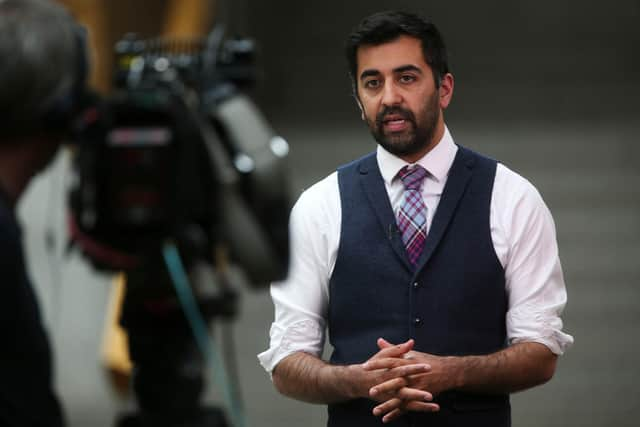Backlog of court cases could take up to a decade to clear, warns courts service chief


The backlog of some court cases in Scotland could take up to a decade to clear without more investment, the chief executive of the courts and tribunals service warned MSPs today.
Eric McQueen told the Scottish Parliament’s justice committee that the number of High Court trials waiting for a court date had doubled since the beginning of the pandemic, with the non-jury trial backlog in Sheriff Courts ballooning to 27,000 compared to pre-Covid levels.
Advertisement
Hide AdAdvertisement
Hide AdHe warned the backlog would take at least two years to clear if more investment was forthcoming from the Scottish Government, but warned that the backlog could take until 2030 to clear.


Justice secretary Humza Yousaf said there is no “silver bullet” to solve the problem and said court delays were more than “just a statistical exercise”, admitting there were “no easy answers”.
At the High Court pre-Covid-19, there was around 390 cases waiting to be heard, a number which has risen to 750 as of the beginning of August and could increase further to 1,400 cases over the next three or four years.
Once the court is back to full capacity, the backlog is likely to plateau at 800 cases unless more money is found.
For jury cases in Sheriff Courts, the backlog has jumped from 500 cases to 1,800 and is likely to rise further to 2,000, and could take five or six years to bring the numbers down to pre-Covid levels.
The figures are most stark in non-jury cases in Sheriff Courts, with the number of trials awaiting a court date sitting at 27,000 cases post Covid, up from 14,000 trials pre-Covid.
Mr McQueen warned the Justice Committee that without additional funding the backlog could take up to a decade to clear.
The courts chief said additional investment for the courts and tribunals service could see backlogs in criminal cases drop to two years if the funding is spent on remote trials and remote jury centres such as those already tested in cinemas in recent weeks.
Advertisement
Hide AdAdvertisement
Hide AdHe said: “If we bring in the remote jury model, and that’s what we are discussing with the government at the moment, we anticipate that we can slowly start to eat into that backlog but it will take something around five or six years to bring it back down to pre-Covid levels.
"We are looking at ways we can increase the capacity further to run more than the normal level of solemn trials and if we can get that operating on the level of investment it could potentially bring the trials back down to the pre-Covid levels again within a two-year period.”
Mr Yousaf later told the committee that there are “no easy solutions” to help reduce the backlog.
He said: "I’ve recently agreed funding to the court service to take forward a groundbreaking and innovative new solution, a new approach that will use cinema complexes as remote jury centres to make up to 16 jury rooms available for High Court trials.
“These are challenges being faced by judiciaries across the world and there’s no easy answers and addressing the case backlog is much more than just a statistical exercise.
"Court delays have a huge human impact and significant implications across the entire justice system. That’s why it is so important that we work together to recover, to renew and transform the system as a whole.”
He added: “There is no silver bullet. There’s not one solution that will magic this problem away even if we did have a pot of money, which you know we don’t.
"In terms of High Court duty trials that [new jury centres] should help prevent the backlog getting bigger. What it won’t do is make a significant dent into the backlog that we had pre-Covid so that’s where we’d have to look at what other solutions we could possibly bring to the table.”
Face masks could be made compulsory in court buildings
Advertisement
Hide AdAdvertisement
Hide AdMr McQueen added that face coverings could become compulsory in the public areas of court buildings “quite quickly” to help increase compliance with social distancing measures.
The courts service chief warned there was a “real risk of complacency” within the courts service, but said the Aberdeen lockdown had sparked action from many.
He said: “I think we’ve seen it amongst our own staff, I’ve probably experienced it myself, we’ve seen it with judges, we’ve seen it with people that use our court buildings that perhaps a risk even up to a few days ago that people were actually maybe getting a bit too complacent and actually it was quite hard to remember.
"I don’t think the measures are weak, it’s just there is a natural complacency.
"One are which we are considering is about the compulsory wearing of face masks. As we start to bring more business back into the courts, I think it is a fairly logical position that we’ll move to quite quickly where we will insist and encourage until we get a legislative basis for face masks are worn in all public areas in all our buildings.”
A message from the Editor:
Thank you for reading this story on our website. While I have your attention, I also have an important request to make of you.
The dramatic events of 2020 are having a major impact on many of our advertisers - and consequently the revenue we receive. We are now more reliant than ever on you taking out a digital subscription to support our journalism.
Subscribe to scotsman.com and enjoy unlimited access to Scottish news and information online and on our app. Visit https://www.scotsman.com/subscriptions now to sign up.
By supporting us, we are able to support you in providing trusted, fact-checked content for this website.
Joy Yates
Editorial Director
Comments
Want to join the conversation? Please or to comment on this article.